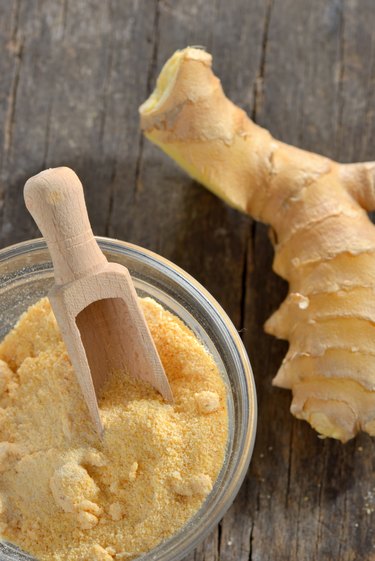
Ginger is a type of root and spice that has been used as a culinary ingredient and traditional medicine for thousands of years. Often taken as a treatment for stomach-related discomfort and illness, boiled ginger contains antioxidants known as phenols and has a number of potential health benefits, among them improved digestion.
Gastrointestinal Relief
Video of the Day
Ginger is commonly used as an herbal remedy for indigestion because it produces an effect that stimulates the movement of the digestive system. According to a study published in October 2005 in "Digestive Diseases and Sciences," ginger extract successfully stimulated digestive travel of charcoal meal in mice, suggesting ginger is an effective way to relieve some types of indigestion. Some of the compounds found in ginger include nitrogen-based compounds and antioxidant compounds known as flavonoids, which are thought to encourage the gastrointestinal effects.
Video of the Day
Protection Against Cancer
Regular boiled ginger consumption could protect against cancer. Cancer typically results from compounds and environmental factors known as mutagens and carcinogens. Anti-mutagens are compounds that prevent or fight against these developments in the body. According to a study published in 2007 in the "International Journal of Cancer Research," rats treated with carcinogens and fed ginger showed fewer mutagens than rats treated with carcinogens alone, suggesting that ginger might be useful in protecting against mutations and cancer development. This property is retained when ginger is boiled.
Anti-Inflammatory Properties
Ginger has been used as an anti-inflammatory traditional medicine for several hundred years, but only recently have its effects been closely examined and analyzed. Consuming boiled ginger provides the body with benefits similar to taking nonsteroidal anti-inflammatory drugs, but with potentially greater benefits and fewer side effects. Ginger extract has been shown to suppress the genes that induce inflammatory responses, making ginger potentially effective in reducing inflammation associated with injuries or chronic diseases like autoimmune arthritis.
Pregnancy-Induced Nausea and Motion Sickness
Ginger is thought to treat nausea and vomiting, and according to a study published in April 2004 in "Obstetrics and Gynecology," 1.1 grams of daily ginger consumption can reduce nausea in pregnant women. The study compared the effectiveness of ginger against supplementation of vitamin B-6, which was shown to be equally effective in reducing nausea, dry heaves and vomiting. Ginger is also frequently used to prevent and treat nausea from motion sickness.
Dosage and Preparation
Ginger tea is available premade but may contain artificial ingredients. To make your own boiled ginger, obtain ginger rhizome and slice it thinly. Take 1 cup of those unpeeled ginger slices and boil them in 8 cups of water for approximately 25 minutes, or until it is reduced to 5 cups. Allow it to cool, divide it into mugs and add flavorings to taste. The beverage can be consumed hot or cool.
- Digestive Diseases and Sciences: Pharmacological Basis for the Medicinal Use of Ginger in Gastrointestinal Disorders
- International Journal of Cancer Research: In Vivo Antimutagenic Potential of Ginger on Formation and Excretion of Urinary Mutagens in Rats
- Journal of Medicinal Food: Ginger -- An Herbal Medicinal Product With Broad Anti-Inflammatory Actions
- Obstetrics and Gynecology: A Randomized Controlled Trial of Ginger to Treat Nausea and Vomiting in Pregnancy
- University of Maryland Medical Center: Ginger
- Food Network: Ginger Tea Recipe